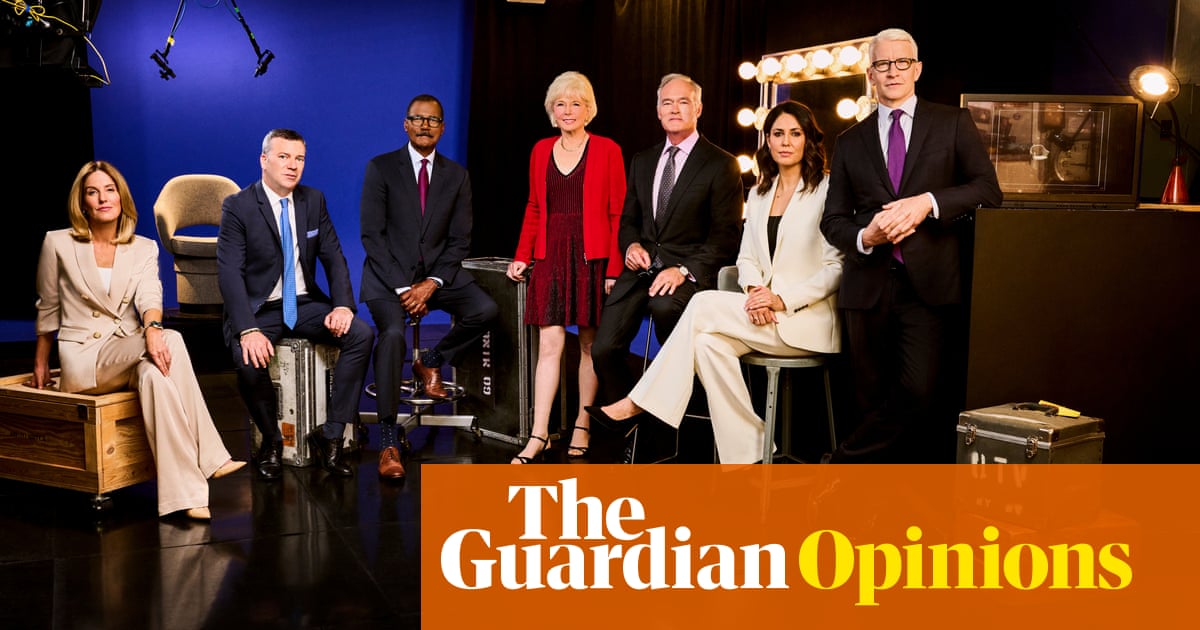There have been so many red alerts for press freedom in the United States over the past few months that it can be hard to know which ones really matter.
The one at CBS’s 60 Minutes really matters.
It came as a one-two punch. First, Bill Owens, the highly respected executive producer of the venerable news showstepped down, writing in a letter to employees that he no longer felt he had crucial editorial independence. It had become clear, he wrote, “that I would not be allowed to run the show as I have always run it”.
Although he wasn’t specific, corporate interference was clearly the problem, as the network’s parent company, Paramount, has been trying to get federal approval for a big media merger.
Owens’s departure was a shocker, but one that was mostly felt internally at CBS and in media-watching circles.
Last Sunday night, the problem went public – dramatically so. One of the most well-known faces of 60 Minutes, the correspondentScott Pelley, closed out the program with a remarkable statement to the audience. He praised Owens and made the context painfully clear.
“Stories we’ve pursued for 57 years are often controversial – lately, the Israel-Gaza war and theTrump administration,” Pelley said. “Bill made sure they were accurate and fair … but our parent company, Paramount, is trying to complete a merger. The Trump administration must approve it. Paramount began to supervise our content in new ways.”
Pelley said that, to date, no story had been killed but that Owens “felt he lost the independence that honest journalism requires”.
Pelley’s comments were picked up widely, and now the world knows that viewers can no longer fully trust what they see on the Sunday evening show that has done such important and groundbreaking journalism for decades.
Of course, as with so many of the red alerts mentioned above – lawsuits, threats, changes in long-held practices that protect the public’s right to know – the problem involves Donald Trump’s overweening desire to control the media. Controlling the message is what would-be authoritarians always do.
Trump sued 60 Minutes for $20bn a few months ago, claiming unfair and deceptive editing of an interview with his then rival for the presidency, Kamala Harris. And his newly appointed head of the Federal Communications Commission, Brendan Carr, took an aggressive approach by reopening an investigation into CBS over supposed distortion of the news. The editing of the Harris interview, by all reasonable accounts, followed standard practices.
What has happened with 60 Minutes is a high-octane version of what is happening everywhere in Trump 2.0.
Those whocouldstand up to Trump’s bullying are instead doing what scholars of authoritarianism say must be avoided, if democracy is to be salvaged. They are obeying in advance.
Not everyone, of course. It’s inspiring to see prominent institutions – Harvard and other universities, many law firms, Georgetown law school, and the Associated Press – refusing to buckle.
They may pay a price. Perhaps a lucrative merger won’t go through, perhaps important federal grants will be lost, perhaps they’ll lose access to news sources, or be punished in some other way. But they’ll have their reputations and integrity intact.
For universities, for law firms and certainly for media companies like CBS, that’s extremely important.
And what’s more, yielding to Trump’s bullying is never successful in the long run. The goalposts of appeasement will be moved, again and again.
Just think of what happened with Jeff Bezos, who has put at risk the editorial independence of the Washington Post, which he owns, in order to please Trump and protect the fortunes of his companies, including Amazon.
Did all his bending the knee – including killing a Post endorsement of Harris just before the election – buy him long-term protection? Certainly not. When Amazon reportedly planned to display the cost of Trump’s tariffs next to prices on the site, theWhite House went ballistic, calling it a “hostile and political act”.
You can guess what happened next. Amazon buckled, disavowing and scrapping the plan.
If the rich and powerful won’t stand up to Trump, what hope can there be for the disenfranchised and powerless?
Journalists at 60 Minutes are telling us that Shari Redstone, the executive and heiress who is the controlling shareholder of Paramount, is doing real damage by appearing to intrude into her venerable show’s independence. She may get the merger she wants but only at great cost to the journalism of which she should be a stalwart steward.
There was another road to take – certainly a less traveled one but one with a far better destination in mind.
Margaret Sullivan is a Guardian US columnist writing on media, politics and culture
